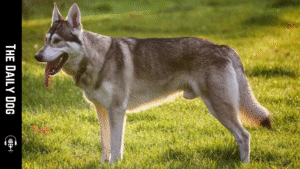From the rugged slopes of the Atlas Mountains to the sun-baked plains of North Africa, the Aidi stands as a striking emblem of endurance and alert guardianship. Often referred to as the Aidi Dog or the Atlas Mountain Dog, this ancient working breed has earned a reputation for steadfast loyalty, protective instincts, and robust, weather-ready stature. For families, breeders, and canine enthusiasts exploring guardian breeds, the Aidi offers a unique blend of independence, sensitivity to its surroundings, and a deep connection to its home terrain. This article explores the Aidi’s origins, temperament, care needs, training considerations, and what it takes to welcome this impressive canine into a modern home.
A lineage rooted in desert and mountains
The Aidi’s roots lie in the harsh and varied landscapes of North Africa. Historically used by Berber communities to guard livestock, homes, and caravans, the breed developed a keen sense of territory, an ability to operate in extreme temperatures, and a calm stamina that suits long, solitary work days. Unlike many modern companion dogs, the Aidi’s temperament evolved around vigilance, decision-making, and a readiness to act when a threat or need arises. This breed’s ancestral purpose informs its modern-day temperament: alert and confident, but emotionally attached to those it considers its flock.
Athletic build and notable presence
Physically, the Aidi is a medium- to large-sized guardian with a muscular frame and a weatherproof coat. Males typically present a sturdy, broad chest, strong limbs, and a powerful, dignified gait. The coat can be short to medium-length, often carrying a double layer that helps insulate in cooler mountain evenings while shedding seasonal dead fur. Color patterns vary, with sable, fawn, brindle, and white markings common across individuals, each contributing to the dog’s striking, statuesque silhouette. Beyond aesthetics, the breed’s physique reflects its guarding role: resilient joints, a deep chest for endurance, and a keen, athletic stance that communicates readiness.
Temperament: independence, loyalty, and protective instinct
The Aidi’s temperament balances independence with a strong loyalty to family and property. This is not a dog that thrives on constant, high-frequency praise or pressure-based training; instead, it responds well to consistent, respectful leadership and clear boundaries. Because of its guarding heritage, the Aidi is naturally cautious of unfamiliar people or situations and will assess a new arrival before reacting. This makes early socialization especially important, ensuring the dog can differentiate between an invited guest and a potential intruder while preserving its protective stance without unnecessary aggression.
Despite their wary exterior, many Aidi dogs form deep, affectionate bonds with family members. They often display a gentle, patient attitude toward children within the household when properly raised and supervised. The same loyalty that makes them exceptional guardians can also translate into impressive deterrence to potential threats, even when the threat is mental rather than physical.
Living with an Aidi: space, climate, and daily routine
Because of their ancestry and protective temperament, Aidi dogs tend to do best in homes where they have access to space and a predictable routine. A secure yard or fenced area gives them the freedom to patrol and observe without feeling confined. Indoor environments should still provide a home base of comfort, with a crate, a dedicated resting area, and a predictable schedule for meals, walks, and training.
Climate can significantly affect an Aidi’s comfort level. Their double coat handles cool mountain air well, but in hotter climates, owners must be mindful of heat management. Access to shade, ample water, and air circulation is essential, along with adjusted exercise times to avoid the peak heat of the day. Regular grooming helps maintain coat health and can assist with temperature regulation by reducing excess fur during shedding seasons.
Exercise and mental stimulation: key to balance
As a working guardian breed, the Aidi benefits from daily physical activity and mental challenges. A combination of aerobic exercise, long walks, hiking, or safe jogs—and structured, skill-Based activities helps channel natural energy in constructive directions. Mental exercise is equally important: puzzle feeders, scent work, and problem-solving tasks engage a dog’s intelligence while reinforcing calm, confident behavior. Because of their watchful nature, Aidi dogs often excel in structured activities that require focus, such as basic obedience with an emphasis on self-control or guardianship-specific drills under professional supervision.
Training: principles for success
Effective training for an Aidi begins with early socialization and consistent leadership. Early exposure to a variety of people, animals, environments, sounds, and textures helps prevent over-guarding or skittish behavior. Positive reinforcement remains a reliable approach, but it should be paired with clear boundaries and predictable routines. Because the Aidi can be independent-minded, training sessions should be concise, frequent, and focused on practical tasks that reinforce self-control, impulse management, and impulse control around potential triggers.
When introducing the Aidi to households with children or other pets, gradual exposure and supervised interactions are essential. Teach family members and visitors how to approach respectfully, and ensure the dog has a safe space they can retreat to if feeling overwhelmed. Professional guidance from a trainer experienced with guard dogs or guardian breeds can help tailor a training plan to your dog’s personality and environment.
Grooming and care: practical maintenance
The Aidi’s coat, while protective, requires regular grooming to maintain coat health and skin integrity. Brushing several times a week helps minimize shedding and reduces the formation of mats, particularly in seasons when fur is changing. Bathing should be routine only when necessary, to avoid stripping the coat of its natural oils. Regular ear checks, dental care, and nail maintenance round out a practical grooming regimen.
Diet and weight management support overall health and vitality. Choose a high-quality dog food appropriate for the dog’s age, size, and energy level, and adjust portions to maintain a healthy body condition. Fresh water should always be available, and periodic veterinary checkups are important to monitor heart health, joints, and potential breed-specific concerns.
Health considerations and breed-specific concerns
The Aidi is generally robust, but like all breeds, it has potential health issues to monitor. Responsible breeders prioritize health screenings, including hips for symmetry and mobility, behavioral assessments, and eye health. Prospective owners should seek out breeders who provide health clearances and a transparent lineage. Regular veterinary care, early vaccination, parasite prevention, and dental care contribute to a longer, healthier life for the breed.
Protection, suitability, and family fit
Potential guardianship roles for Aidi dogs include family protection, rural property guarding, and active households that value a partner with alertness and resilience. They tend to be most content in homes where they are integrated into a consistent daily routine and where family members understand their need for space, leadership, and meaningful work. In urban settings or apartments, an Aidi can adapt well if supplied with ample exercise, enrichment, and a strong routine, but they often thrive in environments that honor their instinct to patrol and observe their surroundings.
Choosing an Aidi: what to consider
If you’re contemplating adding an Aidi to your family, evaluate your lifestyle, property layout, climate, and willingness to invest time in training and socialization. The breed’s natural reserve means an owner must be prepared to guide and supervise while respecting the dog’s independence. A compatible household will feature clear rules, a secure space for rest, consistent daily activity, and a commitment to ongoing training and social experiences. Potential adopters should also consider the breed’s longevity and the need for ongoing mental and physical engagement as the dog ages.
The role of the breeder or rescue in responsible ownership
Whether acquiring a puppy or adopting an adult Aidi, working with a reputable breeder or rescue organization is crucial. Reputable breeders can provide a documented lineage, health clearances, and guidance on care and temperament. Rescue and shelter options may offer adults with established temperaments that can be matched to a family’s living situation. In all cases, prospective owners should insist on a thorough health history, behavioral assessments, and opportunities to meet the dog’s littermates or housemates to gauge compatibility.
Aidi in modern life: integration without compromising heritage
The Aidi’s transition from a traditional guard dog of rural landscapes to a modern guardian companion involves balancing heritage with contemporary living standards. The ideal owner will honor the breed’s instinct to protect while ensuring the dog has positive social experiences, predictable routines, and a healthy outlet for its energy. When integrated thoughtfully, the Aidi can be a confident, steady partner, offering companionship, protection, and a remarkable presence that enriches the household.
Storytelling through the Aidi: a breed with a narrative
The Aidi’s story is one of adaptation without surrender. Its guardianship legacy speaks to a time when communities relied on loyal, capable dogs to safeguard livestock and families against diverse threats. Today, that narrative persists in households that value loyalty, resilience, and an unwavering sense of duty. Each Aidi carries a piece of that history, translating it into daily life through vigilance, affectionate bonds, and a cooperative temperament that conspires with their humans to maintain safety and peace of mind.
Travel, adventure, and outdoor life with an Aidi
For active families who love outdoors, the Aidi can be an ideal companion. Their stamina suits long hikes, mountain trails, and rural explorations, where their senses are sharpened by new landscapes and smells. The dog’s natural curiosity and protective instincts can make outdoor adventures both engaging and secure, so long as the environment remains controlled and safe. Training for recalls and boundary awareness in open spaces helps maintain a constructive partnership between dog and owner while preserving the breed’s independence.
Branding the Aidi in education and industry
Guard dog breeds like the Aidi often find homes in diverse roles, from personal guardians to working dogs in agricultural or border settings. Their intelligence, independence, and alertness can translate into successful performance in professional contexts when paired with experienced handlers and ethical training methods. For families and individuals seeking a dog that embodies dignity, strength, and a keen sense of responsibility, the Aidi offers a compelling choice that blends traditional guardianship with modern companionship.
Conclusion: embracing the Aidi with respect and preparation
The Aidi is more than a guardian breed; it’s a living connection to a landscape of resilience and tradition. Its dignified presence, intense loyalty, and practical needs form a portrait of a dog that thrives when given purpose, structure, and plenty of room to enact its natural guarding behaviors in a controlled, respectful environment. With thoughtful socialization, consistent training, and a commitment to their welfare, Aidi dogs can become loyal, protective family members who enrich every day with their quiet confidence and steadfast companionship.
If you’re considering welcoming an Aidi into your life, begin by researching responsible breeders or reputable rescue organizations, schedule meet-and-greets with potential dogs, and consult with a veterinarian or canine behaviorist to tailor a care and training plan to your living situation. The journey with an Aidi is rewarding for those prepared to invest in a canine partner that embodies endurance, heart, and a noble guardian spirit.
Notes for readers and prospective owners
- Socialization matters from puppyhood. Introduce the Aidi to a wide range of people, places, and situations to foster confidence without overexposure.
- Routine builds trust. Consistent feeding times, exercise schedules, and training sessions help the dog understand expectations and reduce anxiety.
- Exercise and enrichment are not optional. A bored Aidi may channel energy into unwanted behavior, so plan a mix of physical activity and mental challenges.
- Professional guidance is valuable. Working with a trainer experienced with guardian breeds can accelerate positive outcomes and reduce frustration for both dog and owner.
The Aidi represents a unique blend of ancient guardianship and contemporary companionship. For the right family or owner, this breed offers companionship, a protective presence, and a striking, resilient personality that speaks to a deep-rooted life spent guarding, observing, and protecting a valued home. In embracing the Aidi, you welcome a partner whose strength is matched by a faithful heart, a dog that will stand by you through quiet evenings and challenging days alike.
We offer a FREE Strategy Call.
Click on the graphic to learn more
Read More


Northern Inuit Dog: A Wolf-Inspired Companion for Active, Experienced Owners








